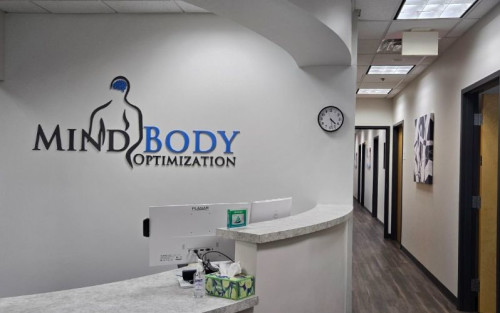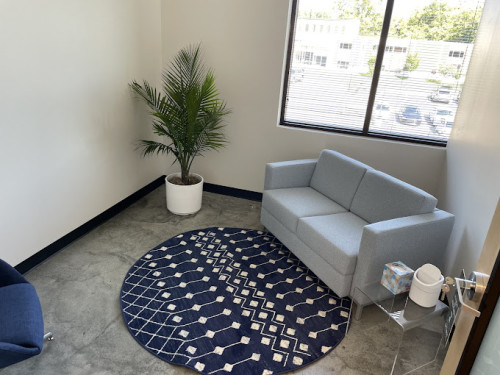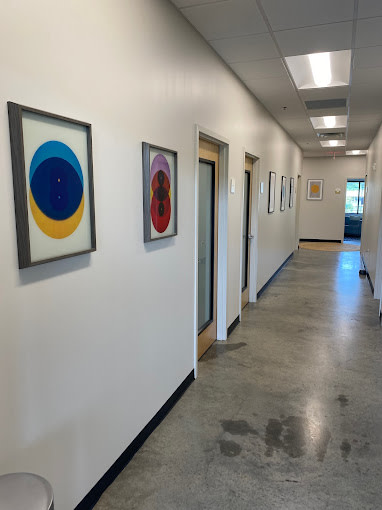






Mind Body Optimization - Franklin
Treatment Focus
This center treats substance use disorders and mental health conditions. You'll receive individualized care catered to your unique situation and diagnosis, learn practical skills for recovery, and make new connections in a restorative environment.
Primary Level of Care
Outpatient treatment offers flexible therapeutic and medical care without the need to stay overnight in a hospital or inpatient facility. Some centers off intensive outpatient program (IOP), which falls between inpatient care and traditional outpatient service.
Claimed
Recovery.com has connected directly with this treatment provider to validate the information in their profile.
Treatment Focus
This center treats substance use disorders and mental health conditions. You'll receive individualized care catered to your unique situation and diagnosis, learn practical skills for recovery, and make new connections in a restorative environment.
Primary Level of Care
Outpatient treatment offers flexible therapeutic and medical care without the need to stay overnight in a hospital or inpatient facility. Some centers off intensive outpatient program (IOP), which falls between inpatient care and traditional outpatient service.
Provider's Policy
We will run a verification on your insurance benefits and determine your out-of-pocket costs for treatment. If you will not be using insurance benefits, we’ll go over the costs of treatment and create a financial plan.
Mind Body Optimization - Franklin
Mind Body Optimization - Franklin
About Mind Body Optimization - Franklin
Mind+Body Optimization is an outpatient program promoting overall wellness for adults and adolescents using innovative therapies combined with clinical modalities and evidence-based methods. Their Franklin location specializes in private 1-on-1 therapy, an intensive outpatient program, psychiatry services and medication management, and mental health or recovery coaching. Their holistic, dual-diagnosis program offers personalized treatment for mental health conditions, substance abuse, and co-occurring disorders.
Primary Mental Health Treatment
Mind+Body provides personalized care and quality treatment in a healing and interactive outpatient environment. In addition to 1:1 counseling, psychiatry, they offer innovative treatments such as eye movement desensitization reprocessing (EMDR) and transcranial magnetic stimulation (TMS) for conditions such as anxiety and depression, bipolar disorder, and post-traumatic stress disorder (PTSD). Psychiatrists prescribe effective medications such as antidepressants and mood stabilizers for individuals in need. Counseling provides 1:1 talk-based and evidence-based therapy, with couples and family counseling sessions also available. Mental health services are available for patients of all ages who may be experiencing prolonged feelings of sadness, severe anxiety, intense anger, issues coping with daily life, suicidal ideation or self-harm, hallucinations, excessive worrying, sudden or severe mood swings, and more.
Substance Abuse and Co-Occurring Disorders
The intensive outpatient program (IOP) at Mind+Body is designed to treat individuals with substance abuse or co-occurring disorders, and also offers a specialized treatment track for problem drinking. Experienced and compassionate staff address and explore risk factors for substance abuse and co-occurring disorders such as genetics, environment, and mental health. IOP offers individualized care that typically is on set days for upwards of 20 hours per week. Treatment may consist of individual counseling, group therapy sessions and medical care or medications for any mental or overall health concerns. The number of hours spent in treatment decreases over time until the client feels ready to end IOP and begin an aftercare program.
Substance abuse with co-occurring disorders are treated simultaneously, allowing clients to explore and treat underlying contributing factors with a range of proven methods while addressing their substance misuse. Co-occurring mental health disorders treated may include anxiety disorders, attention deficit hyperactivity disorder (ADHD), depressive disorders, mood disorders, eating disorders, and trauma related disorders such as PTSD.
Innovated Treatment Methods
In addition to cutting-edge, innovative treatment methods such as EMDR and TMS, Mind+Body also offers ketamine therapy. Ketamine therapy may be an option for mental health conditions such as severe or prolonged depression, anxiety or social anxiety disorders, and PTSD that has not responded to more traditional treatment methods. It is used in addition to therapies such as talk therapy or group counseling, providing ongoing support for clients as they develop coping skills as ketamine therapy provides relief from symptoms. Ketamine therapy is shown to help additional treatment methods be more effective, with therapeutic effects often occurring within hours of the treatment session.
Aftercare services offer mental health or recovery coaches, providing clients with personalized guidance, accountability, and encouragement and support as individuals reintegrate into their daily lives and work toward emotional regulation, coping strategies, and long-term success in recovery.
Mind+Body Optimization in Franklin is a Joint Commission accredited facility providing individuals with expert guidance with accredited counselors, a comprehensive and holistic approach, and tools and coping strategies for managing stress, overcoming obstacles, and finding life balance. They also offer telehealth services with access to individual and group therapy virtually.
Center Overview
Treatment Focus
This center treats substance use disorders and mental health conditions. You'll receive individualized care catered to your unique situation and diagnosis, learn practical skills for recovery, and make new connections in a restorative environment.
Joint Commission Accredited
The Joint Commission accreditation is a voluntary, objective process that evaluates and accredits healthcare organizations (like treatment centers) based on performance standards designed to improve quality and safety for patients. To be accredited means the treatment center has been found to meet the Commission's standards for quality and safety in patient care.
Insurance Accepted
Cash Pay Rates
Estimated Cash Pay Rate
Center pricing can vary based on program and length of stay. Contact the center for more information. Recovery.com strives for price transparency so you can make an informed decision.
Levels of Care








Your Care Options
Specializations
Depression
Symptoms of depression may include fatigue, a sense of numbness, and loss of interest in activities. This condition can range from mild to severe.
Drug Addiction
Drug addiction is the excessive and repetitive use of substances, despite harmful consequences to a person's life, health, and relationships.
Transcranial Magnetic Stimulation
Localized magnetic pulses stimulate areas of the brain to increase brain activity and reduce abnormal functions.
Ketamine Therapy
Ketamine therapy uses ketamine, a dissociative anesthetic, to provide rapid relief for severe depression, trauma symptoms, and other mental health conditions.
Who We Treat
Men and Women
Men and women attend treatment for addiction in a co-ed setting, going to therapy groups together to share experiences, struggles, and successes.
Adolescents
Teens receive the treatment they need for mental health disorders and addiction, with the added support of educational and vocational services.
Children
Treatment for children incorporates the psychiatric care they need and education, often led by on-site teachers to keep children on track with school.
Approaches
Personalized Treatment
The specific needs, histories, and conditions of individual patients receive personalized, highly relevant care throughout their recovery journey.
Medical
Medical addiction treatment uses approved medications to manage withdrawals and cravings, and to treat contributing mental health conditions.
Holistic
A non-medicinal, wellness-focused approach that aims to align the mind, body, and spirit for deep and lasting healing.
Evidence-Based
A combination of scientifically rooted therapies and treatments make up evidence-based care, defined by their measured and proven results.
Therapies
Stress Management
Patients learn specific stress management techniques, like breathing exercises and how to safely anticipate triggers.
1-on-1 Counseling
Patient and therapist meet 1-on-1 to work through difficult emotions and behavioral challenges in a personal, private setting.
Family Therapy
Family therapy addresses group dynamics within a family system, with a focus on improving communication and interrupting unhealthy relationship patterns.
Nutrition Counseling
Nutritious food helps patients heal from within, setting them up for mental and bodily wellness as they learn about healthy eating.
Transcranial Magnetic Stimulation
Localized magnetic pulses stimulate areas of the brain to increase brain activity and reduce abnormal functions.
Online Therapy
Patients can connect with a therapist via videochat, messaging, email, or phone. Remote therapy makes treatment more accessible.
Eye Movement Therapy (EMDR)
Lateral, guided eye movements help reduce the emotional reactions of retelling and reprocessing trauma, allowing intense feelings to dissipate.
Conditions We Treat
Post Traumatic Stress Disorder
PTSD is a long-term mental health issue caused by a disturbing event or events. Symptoms include anxiety, dissociation, flashbacks, and intrusive thoughts.
Anxiety
Anxiety is a common mental health condition that can include excessive worry, panic attacks, physical tension, and increased blood pressure.
Depression
Symptoms of depression may include fatigue, a sense of numbness, and loss of interest in activities. This condition can range from mild to severe.
Suicidality
With suicidality, a person fantasizes about suicide, or makes a plan to carry it out. This is a serious mental health symptom.
Stress
Stress is a natural reaction to challenges, and it can even help you adapt. However, chronic stress can cause physical and mental health issues.
Bipolar
This mental health condition is characterized by extreme mood swings between depression, mania, and remission.
Trauma
Some traumatic events are so disturbing that they cause long-term mental health problems. Those ongoing issues can also be referred to as "trauma."
Eating Disorders
An eating disorder is a long-term pattern of unhealthy behavior relating to food. Most people with eating disorders have a distorted self-image.
Self-Harm
The act of intentionally harming oneself, also called self-injury, is associated with mental health issues like depression.
Substances We Treat
Cocaine
Cocaine is a stimulant with euphoric effects. Agitation, muscle ticks, psychosis, and heart issues are common symptoms of cocaine abuse.
Prescription Drugs
It's possible to abuse any drug, even prescribed ones. If you crave a medication, or regularly take it more than directed, you may have an addiction.
Benzodiazepines
Benzodiazepines are prescribed to treat anxiety and sleep issues. They are highly habit forming, and their abuse can cause mood changes and poor judgement.
Ecstasy
Ecstasy is a stimulant that causes intense euphoria and heightened awareness. Abuse of this drug can trigger depression, insomnia, and memory problems.
Co-Occurring Disorders
A person with multiple mental health diagnoses, such as addiction and depression, has co-occurring disorders also called dual diagnosis.
Psychedelics
Hallucinogenic drugs—like LSD—cause euphoria and increased sensory experiences. When abused, they can lead to depression and psychosis.
Drug Addiction
Drug addiction is the excessive and repetitive use of substances, despite harmful consequences to a person's life, health, and relationships.
Heroin
Heroin is a highly addictive and illegal opioid. It can cause insomnia, collapsed veins, heart issues, and additional mental health issues.
Languages
Aftercare
Care Designed for Your Needs
Special Considerations
Couples program
Using gentle clinical care, therapists guide patients and their partner through guided sessions to address issues and work towards lasting solutions.





